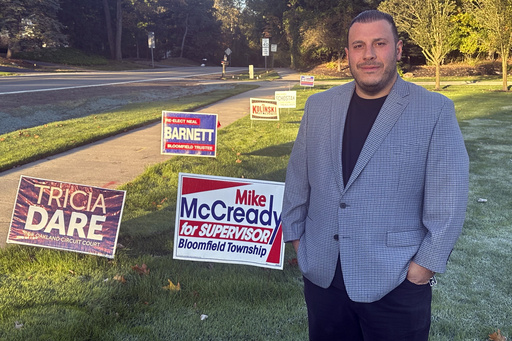BLOOMFIELD TOWNSHIP, Mich. — At his suburban Detroit residence, Nick Hannawa has set up political signs endorsing candidates for various local positions such as prosecutor and supervisor. However, when it comes to the presidential election, Hannawa has chosen not to showcase his choice publicly.
Hannawa, 37, expresses a desire to avoid the complications that arise during this divisive election year. In his affluent neighborhood in Michigan, he notes that many of his neighbors share similar views, opting not to publicly support a presidential candidate. They believe it is more manageable to refrain from displaying what used to be a normal demonstration of political allegiance outside their homes.
“Some people love Donald Trump. Some people hate Donald Trump,” he commented, revealing his intention to vote for Trump again. However, he questions the impact of putting up a sign, weighing the chances of alienating some of his neighbors in a politically charged environment.
Hannawa’s county of Oakland has experienced a political shift, having been a battleground in past elections, but it leaned Democratic in both the 2016 and 2020 presidential contests. Nonetheless, Republicans are determined to regain support in the area, working strategically to win back conservative voters one household at a time.
David Dulio, who leads the Center for Civic Engagement at Oakland University, observes that urban settings have predominantly supported Democrats, while rural regions typically back Republicans. The suburbs, according to Dulio, represent the battlegrounds where campaigns intensively compete for voter loyalty.
For many residents, the choice to forgo yard signs reflects a fatigue with the heightened tensions surrounding American politics, particularly evident in the current presidential race between Democrat Kamala Harris and Republican Trump.
Anand Edward Sokhey, a political science professor at the University of Colorado at Boulder and co-author of “Politics on Display: Yard Signs and the Politicization of Social Spaces,” explains that these signs serve as personal statements of identity. He emphasizes that even if neighbors may not know each other’s names, they will remember which houses displayed specific political signs for years.
A recent study revealed that approximately 60% of Americans feel the need to limit their exposure to political information to avoid feeling overwhelmed or fatigued. Alarmingly, there have been recent instances of violence associated with political expressions. One such incident involved a suburban Detroit man who was charged with assault for threatening a Black postal worker over campaign mailings.
In Ohio, a Republican sheriff sparked controversy on social media by suggesting that addresses of residents who displayed Harris signs should be noted for the purpose of relocating immigrants there. Following backlash, the post was swiftly removed due to potential legal repercussions.
Many residents express apprehension about displaying political signs in their yards, with Edward Shehab sharing that he hasn’t put out signs because he’s aware of the potential backlash. “I know who I’m going to vote for, and I don’t need to tell people what we’re going to do,” he remarked. Despite this, at 64, Shehab has displayed Trump-Vance signs this election season, having previously experienced the theft of his Trump-Pence signs.
Dulio notes a conspicuous absence of presidential yard signs in the Detroit area for this election. “Even Trump supporters seem hesitant,” he remarked, suggesting they wish to avoid conflict or the risk of having their signs vandalized or removed.
Hannawa concurs that the risk of confrontation is why he limits his signs to local candidates. “I don’t do the presidential politics (signs). There is so much tension around it,” he stated, highlighting his role as an attorney representing clients across the political spectrum.
Danny Watson, a retired medical professional living nearby, also opts out of placing any election signs in his yard. Identifying as an independent, Watson believes that public political expression could complicate his interactions with patients. “I didn’t want to offend either group of clients I would deal with,” he explained.
In Madison Heights, Jack Robertson stands out as a resident who has placed a Trump sign among three other political signs in his yard. He remarks about the reluctance many feel towards displaying signs, mentioning that some are afraid of upsetting neighbors. “So what? You have a right to do what you want to do. As long as you’re not hurting anybody in the process,” he stated, defending his choice.
Overall, the atmosphere leading up to the elections reveals a deeper anxiety among voters, affecting their willingness to display their political support openly.


